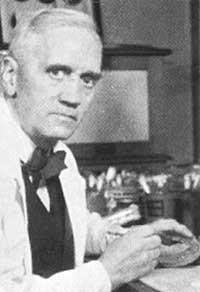Alexander Fleming
Elhuyar Fundazioa
Scottish bacteriologist born in Loudoun (Ayrshire) on August 6, 1881. He studied at the Kilmarnock Academy and in 1902 obtained a scholarship to study medicine at the University of London.
From the beginning he showed interest in bacteriology, especially for the chemotherapy of diseases.
During World War I he worked at the Royal Army Medical Corps. There he began to experiment, discovering in 1922 the protein called lysozyme. This protein, present in tears and mucus, acts against several bacteria.

The most important discovery of flemings occurred uncertainly. In 1928, as a professor at the University of London, he worked with the staph germs and left them uncovered. A few days later, when he finished working with them, when he was going to throw a container with germs, he realized that a few rays of mold fell to him. Around each ray he discovered that the bacteria had disappeared.
Fleming isolated the mold giving the name Penicillium notatum. Mold thought that at the last moment it produced some compound that inhibited bacterial growth. He tested with different types of bacteria. Some continued to grow. Others do not. He then studied the effects of this chemical, which was very important to apply to white blood cells. Although penicillin was poisonous to bacteria, white blood cells in the blood had no negative consequences.
But Fleming was not chemical and could not isolate and identify the substance found. This discovery did not attract people's attention too much. The situation changed radically after the start of World War II. The search for new antibacterial substances was essential for wounded soldiers. Thus, British doctors Flore and Chain started working with penicillin and were very successful.
Years later, the American microbiologist Waksman gave the antibiotic name to penicillin. However, for a long time between the discovery and application of this substance, the German physician Domagk discovered sulfamides. Although these are not strictly antibiotics, they began the era of miraculous drugs.
However, the value of penicillin was known and in 1944 Flemin, along with Florey and Chain, received the Nobel Prize in Medicine. In 1945 he received a new physiology. Fleming died in London on 11 March 1955.





